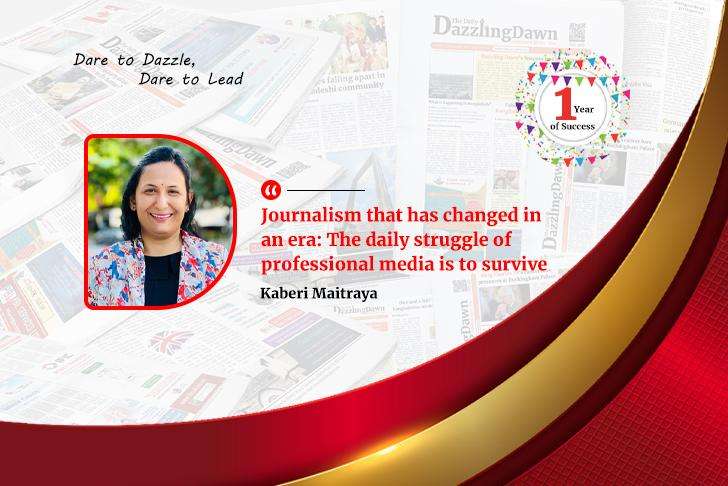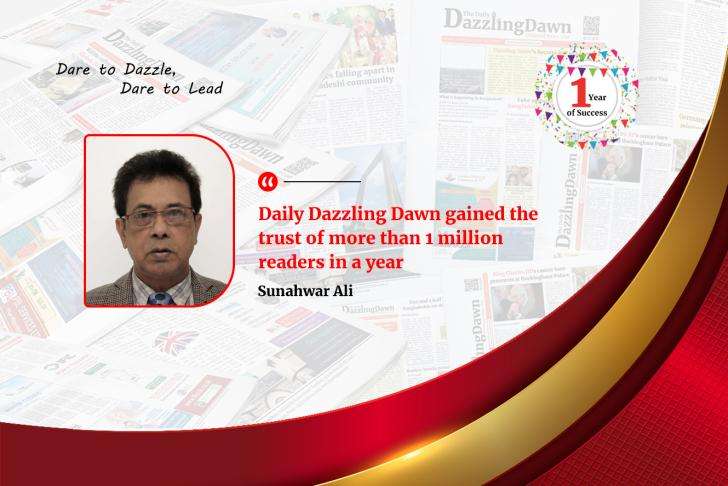Although my profession is journalism, I did my studies mainly in economics. However, I came to journalism from the habit of writing bits and pieces without chasing the so-called job and my strong interest in reading newspapers. At that time, "Daily Amader Shomoy" was the number one newspaper in the country, although it has not yet retreated from its supremacy. I went from thinking that I would do journalism and change society to speaking.
After four months of working without pay, the authorities paid me 6,000 taka per month. After graduating from university, I began working for a private bank, earning more than 32 thousand taka. The family was dissatisfied; no one was pleased because I abruptly left my work and performed such an unpaid task. But I felt relief from within. As usual, the journey to the newsroom started. The rush and bustle of the newsroom, breaking down the day's events into small words and sentences for news readers. The day after the newspaper was published, there was a lot of discussion and criticism on the streets and on the bus. At the time, there were only a few televisions. Online news was not overcrowded. There was no news coverage or analysis on Facebook or YouTube. Overall, journalistic practice was life. The scenario has changed repeatedly.
According to communication specialist Daniel Lerner, mainstream media helps people think more positively. The 'gatekeepers' of society, as he referred to journalists. However, things are starting to change now that a sizable social media market has emerged. I read in an article a few days ago that former US President Barack Obama identified the flourishing condition of the Internet as the primary reason for newspapers' collapse.
Obama was questioned if books were still as popular as films after their debut. People haven't forgotten to read books. But why will the Internet diminish the value of newspapers? Obama stated with a tiny smile, 'Because it's simple, business. He said, "Look, the happy days of the middle class are over." Sitting with your back to the sun and reading a newspaper is now a luxury. Why are people losing interest in the newspapers? Think about it.
While Obama is thinking like this, America's newspaper doors are being closed. America's most influential publication, 'Washington Post', has changed ownership. The founder of 'Amazon.com' is going to take ownership of this newspaper. Newspapers in the Western world are facing a crisis in the face of the strong dominance of the Internet. Once the American newspaper Newsweek has been going strong for 80 years, now they are forced to close the print media.
Lately, there is only viral word everywhere. It seems that if it doesn't go viral, if it doesn't get likes on Facebook, or if it doesn't get views on YouTube, no event is an event, and no news is no news. Everyone wants to go viral or be viral. But in making this viral, if you lose it, it will be a hindrance.
When low-quality, false, half-truthful, tasteless, insulting, and offensive content is made and distributed in order to obtain fame and millions of views, it has serious effects for both individuals and society. Worse than that is tarnishing the reputation of a person or group by spreading rumours and bothering others.
Another new topic called Troll has entered the market. Trolls also target artists, politicians, businesses, poets, and authors. Heroes and heroines, in particular, are frequently targeted by trolls. Trolling can also be used to perpetrate heinous crimes such as sexual harassment of women, hurting people's religious sensibilities or morals, destabilising the political environment, and generating insecurity. The situation has evolved into a problem rather than a source of pleasure or entertainment.
Media is a repository of information, a tool for social change, and a source of entertainment. Mass media 'agenda setting'. Helping people understand what is important and what is not among contemporary and hot topics. It also shows how to think, give opinions, and protest. Not only that, it is also the job of the media to highlight public opinion. So what will be published or disseminated here must be objective. Journalists cannot write and publish whatever they want just to go viral or increase views. It is a crime to destroy human dignity, corrupt, and mislead society and the state.
However, because social media has emerged victorious, 'yellow journalism' has resurfaced in a new form, based on the popularity of social media in order to compete. A major portion of the media believes that readers enjoy twists, trolls, bullying, funny stories about the lives of heroes and heroines, and candid photos. How many times a hero marries, how many children are fathered, who enters a heroine's room, whose accent is bad, whose child is in whose womb, and how many times an actor has committed adultery—when these stories begin to appear in the high-class papers and some channels jump on the programme. It is important to note that yellow journalism returned in a different form. The objective of these is just to boost views.
Once upon a time, cheap newspapers on the market survived by using such news to drive sales. Numerous media outlets now upload such news online, as opposed to printing it back then. Actress Apu Biswas stated that day, 'Due to the competition to get views, we have to endure a variety of difficulties. The harmful consequences of cyberbullying have become grave. They engage in cyberbullying for no apparent motive other than to increase viewing. And it interferes with people's daily lives, which is very unacceptable. We all live with our family. We've got a location. Perhaps we are actresses, but due to several news stories, we are faced with a variety of scenarios. It's very true.
It is also true that the owners of the popular publication will continue to uphold the "tradition or culture of journalism" regardless of how many crises are caused. The two major issues facing the media industry in recent business deals are retaining readership and sustaining the level of advertising revenue.
On the one hand, freedom of expression can be enjoyed by using digital media, but if it is misused, it can violate the dignity, peace, and rights of other people. This is exactly where the media has to work with this tech-dependent generation. By means of propaganda, they must understand that technology cannot be used to propagate and broadcast anything that is hateful and that may disturb public order or peace, create discrimination between communities, or incite violence. Most importantly, girls cannot be sexually harassed using this technology.
So much hate speech has been spread through Facebook, which has increased various conflicts in Bangladesh. A class of people are propagating hatred or hate speech, and depending on it, discord is created. A large part of the population in our country is illiterate and less educated. They are also not very aware of digital media campaigns. What you see is what you believe. And this opportunity is exploited by dishonest people.
Approximately 86 percent of the youngsters have access to cellphones. Despite the fact that so many people utilise digital media, how many of them are concerned in politics, the economy, social policy, or culture? Or speaking out against internet hate speech? In Bangladesh, not only politics but also education, culture, knowledge, research, and literature have declined in all areas. Bangladesh has made significant progress in infrastructure development, but has fallen behind in human development. Hero Alam rose to prominence over time. Who can halt the erosion of our taste? Will it be considered incorrect to claim that our mass media and social media also have culpability in this case?
The fact that Tisha, a 19-year-old girl, married a man older than her father has made headlines in many media outlets. By the way, following that, the media, including social media, began to revolve around this episode. News, features, interviews, and videos were all covered, and as a consequence, a book about their love story was released at this year's book fair.
There was a time when the drawing rooms of society's tasteful, polite, and educated people contained no tabloids or newspapers that reported sensational and flaming news. Those who profited from yellow journalism were once thrown into the garbage. "Yellow journalism" is not a new concept in journalism. The issue of 'yellow journalism' has existed since the early days of commercial competition in the newspaper industry. The rise of this news thinking remains linked to the newspaper industry's business.
Yellow journalism is journalism in which there is misrepresentation, which is purposefully published and disseminated, and which is fabricated and inflammatory. In the age of digital media, that old history of newspapers has returned anew. Which is more important, quality content or campaign strategy? Not only newspapers, electronic media are also trying to change and expand as much as possible in terms of their content, organization, type of news, features and programs. But in order to increase the views, many tricks are resorted to, which do not exactly fall into the list of palatable news. Sometimes they do not shy away from uploading false and sensational news.
Who's going to break the news first? For this reason, they are quickly posting the news online without first making sure it is true, all in an effort to boost views. A barrier that exists in order to provide this new thing is some distortion: misrepresentation of facts, misrepresentation of language and imagery, news that contains partial truths.
Social media detractors are now referred to as 'haters' or detractors. Consider their work as 'trolls'. They flooded the social media comment area with a variety of unpleasant comments. Do we accept these as viewpoints? As a result, the country's major media has issues. And because it is read, it places a focus on the internet. The circulation of printed newspapers has dropped dramatically, while the audience of online media has grown.
As online media competes with YouTube's unsupported news, the disadvantage of social media becomes more obvious. Should traditional media outlets upload content like social media?
Editing countless news items and photographs, exploiting technology, and causing societal instability can endanger any individual or organisation. Millions of viewers witness, comment on, and share these fabrications or half-truths. Will the content shared on social media compete with mainstream media, or should it be removed? Or push to prevent them?
Another aspect of the media is that they tend to promote the news that the common people like more. It is not a matter of how important that news is. So the same argument can be raised here: that the media is biassed, or that the media shows what the public wants?
The medium is the news; that is, the media takes on a character and then markets that character. It can be done for market interest, competition, politics, culture, and other reasons. So the last question is, does the mass media only affect the people? By being aware of various issues, dreaming Or is the media itself being controlled by the uncontrolled flow of information in the digital world?
When so many questions are swirling in the head and journalists are looking for answers, On June 2, 2023, one of my two colleagues, veteran senior journalists Dulal Ahmed Chowdhury and Munjer Ahmed Chowdhury, established the first English newspaper, The Daily Dazzling Dawn, in London. This journal, which operates with complete professionalism, has already captured the hearts of a million readers both domestically and internationally.
In addition to becoming a news outlet, the newspaper has always provided us with tales of rebirth by compiling all the positive aspects of society. This paper's unceasing thoughts and efforts are directed towards the advancement and well-being of this nation and society. The diaspora of Bangladeshis living abroad has also become ingrained with a shared unity.
The Daily Dazzling Dawn is consistently calm, happy, and sincere. However, the Daily Dazzling Dawn is also cruel. rejects darkness. Not only will this paper be rejected, but it will also tear apart the darkness. Otherwise, why the light? The Daily Dazzling Dawn appears every day. Every day promises that this day will be better than the previous one. Unfortunately, was the day before bad? As it turns out, the prior day seems worse than the current day. That is the expectation.
_7.jpg)


_9.jpg)




.svg)


